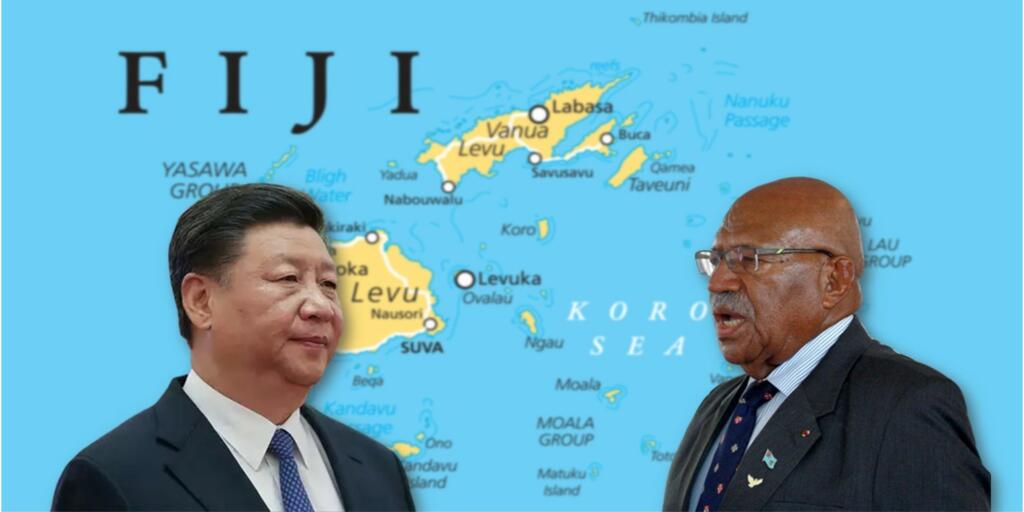The defiance of Fiji in rejecting China’s attempts to control them as a subsidiary state exemplifies the power a small country and can wield in disrupting the ambitions of even the largest superpower. From a vantage point, the development highlights that the world is not to be put in order, the world is order incarnate. It is for us to put ourselves in unison with this order. That is to say even a miniscule nation like Fiji can sense the debacle in the hegemonic dream of China to rule the world with the ‘outmoded imperialistic-expansionism’.
According to a report by the Fiji Times, Fiji Prime Minister Sitiveni Rabuka terminated the memorandum of understanding (MoU) between Fiji and China, effectively canceling the arrangement for Chinese police officers to be sent to Fiji for attachment programs lasting three to six months. The move rings to fore the prominence of statesmanship and patriotic might of Fiji.
Fiji Thwarts China’s Expansionist Plans, Rejects MoU
The extremely small country with a mere 900,000 citizens has stood up to China, putting an end to its expansionist practices that had been causing concern among neighboring nations. The dragon country has a tendency to establish military bases in other countries as a means of making advancements, and had tried to do so in Fiji. However, Fiji has ended their security agreement with the Chinese, sending a clear message of resistance. Conversely it has put an end to the escalating speculations of Fiji falling in the hands of China which was aiming to use the region as a satellite nation.
Contrarily, after being an eyewitness to the fiasco of Nepal and Sri Lanka at the hands of Chinese, Fiji seems to part its ways with the expansionist Chinese. According to the Fiji Times, Prime Minister Sitiveni Rabuka stated that the memorandum of understanding (MoU) between Fiji and China, which involved Fijian police officers undergoing training in China, is no longer necessary due to the differing systems of democracy and justice. Rabuka mentioned Australia and New Zealand as nations with similar systems, and announced the termination of the MoU which permitted Chinese personnel to work within the Fiji Police Force.
Australia Steers Fiji Away from China’s Grip
The development takes place in the backdrop of October 2022, wherein Australia and Fiji signed several agreements aimed at strengthening their defense cooperation. As per the reports of Reuters, ‘Australia, perceived as a leader in the South Pacific region, has played a crucial role in the formation of the South Pacific Forum and has influenced the region’s response to competition between China and the United States’.
In April 2022, the United States, Australia, and New Zealand grew concerned about China’s presence in the South Pacific after the Solomon Islands signed a security cooperation agreement with China. This agreement allowed China to send police and military forces to the Solomon Islands to help maintain social order, protect lives and property, and provide humanitarian aid. It also allowed Chinese personnel and projects to be protected, and for Chinese ships to stopover and resupply in the Solomon Islands.
The signing of a bilateral security agreement between the Solomon Islands and China has caused concern among Australia and the United States. The fear of China building “security perches” in the South Pacific has led to tension in both Canberra and Washington DC. Meanwhile, Manasseh Sogavare, the Prime Minister of the Solomon Islands, described Australia’s bilateral security agreement as inadequate. The statement is sufficient to highlight the fact that Solomon Islands has already started to play at the hands of China and has become a dummy-state of the dragon.
As a result of these developments, Australia has become increasingly concerned and has influenced Fiji to move away from China. These events highlight the ongoing competition for influence in the South Pacific region and the delicate balance of power between China and the United States.
Also Read: Mongla Port is the new battleground for India and China
Fiji chooses Regional Alliance over Beijing
More interestingly, the event brings to light the more significant issue that even a small nation like Fiji, on the edges of the Pacific, has opted to side with the member of the ‘Quadrilateral Security Dialogue or Quad’ in contrast to China. This exemplifies the fact that the Chinese dragon is getting isolated at the global stage and sooner or later the nations allying with China will fall apart owing to its expansionist policy.
Moreover, the development at Fiji has great geopolitical ramifications, as the Chinese policy in the Indo-Pacific is suffering serious setbacks in the recent past. Consequently, providing India with an opportunity to fill in the vacuum and challenge the expansionist Chinese.
Support TFI:
Support us to strengthen the ‘Right’ ideology of cultural nationalism by purchasing the best quality garments from TFI-STORE.COM
